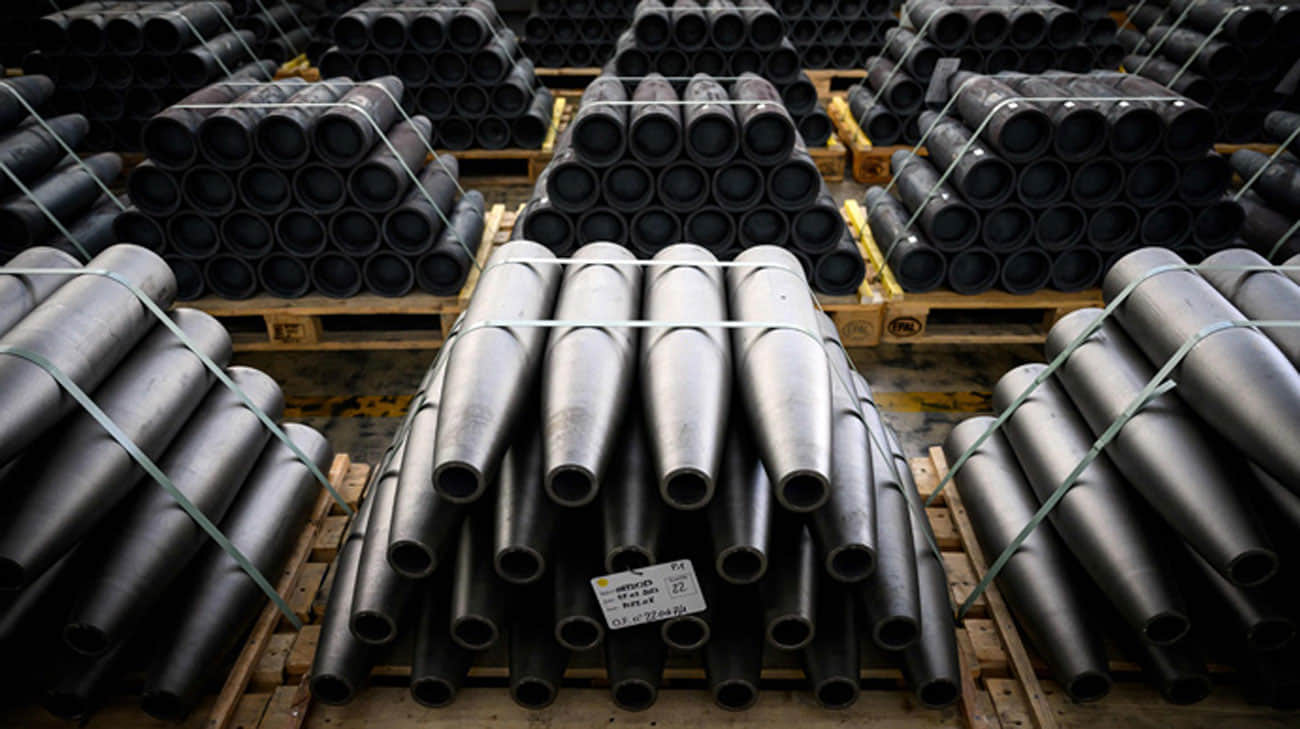Ukraine's Defence Procurement Agency purchased weapons through specialised importers at inflated prices
Ukraine's Defence Procurement Agency (DPA), established in mid-2022 in line with NATO standards to ensure transparency in arms purchases and prevent corruption, has entered into contracts with special exporters who have significantly overcharged, missed deadlines or failed to fulfil orders altogether.

Ukraine's Defence Procurement Agency (DPA), established in mid-2022 in line with NATO standards to ensure transparency in arms purchases and prevent corruption, has entered into contracts with special exporters who have significantly overcharged, missed deadlines or failed to fulfil orders altogether. As a result, these exporters have accumulated millions of dollars in debts to the state, all while the Armed Forces of Ukraine faced urgent shortages of weapons.
Source: Ukrainska Pravda investigation Defence Intelligence is shopping. How Ukraine overpays tens of millions of euros for delayed weapons deliveries
Details: Ukrainska Pravda journalist Mykhailo Tkach notes that when the DPA was established, NATO recommended liquidating the so-called special importers – companies that used to sell Ukrainian weapons abroad and are now responsible for purchasing them from abroad for Ukraine.
The investigation mentions explicitly the State Cost-Accounting Foreign Trade Company Spetstechnoexport, which, at the request of Defence Intelligence of Ukraine (DIU) in mid-2022, was removed from the jurisdiction of the Defence Ministry and reassigned to DIU.
Quote from Mykhailo Tkach: "Numerous Ukrainska Pravda sources related to arms procurement indicate that SpetsTechnoExport sometimes sets records for the highest prices, causing an increase in prices for certain types of weapons from all other suppliers. Furthermore, this state-owned company increasingly finds itself in disputes with the state, represented by the Defence Procurement Agency, over financial matters."
Details: At the end of the first year of the full-scale invasion, Volodymyr Pikuzo was appointed as the first head of the newly created Defence Procurement Agency.
Ukrainska Pravda sources reported that Pikuzo signed contracts with SpetsTechnoExport worth over UAH 50 billion (roughly US$1.2 billion) during his tenure.
At the same time, SpetsTechnoExport, as a special importer, received a commission of 3% of each contract from the state.
"As a result, SpetsTechnoExport’s commission during Volodymyr Pikuzo's year and a half in charge totalled over UAH 1.5 billion (US$36.4 million). The contracts signed between the DPA and SpetsTechnoExport – that is, Pikuzo and [SpetsTechnoExport chief Oleksii] Petrov – require particular scrutiny. More precisely, the price at which the weapons were purchased requires attention," the investigation says.
On 27 October 2023, SpetsTechnoExport signed a state contract with the DPA for the supply of 80,000 120 mm mortar bombs. The contract amounted to UAH 2.3 billion (US$55.8 million), translating to a cost of about €640-680 per piece. The rounds were to be manufactured in India and supplied through the Czech company Excalibur Army.
Ukrainska Pravda sources related to defence procurement indicate that this cost is the highest among all contracts signed after the start of the full-scale Russian invasion. The average price of a 120 mm munition is between €520 and €560.
"Accordingly, the potential loss of budgetary funds on this contract alone could amount to €11 million...," the journalist said.
Under the terms of this contract, the Ukrainian defence forces were to receive 36,000 120 mm mortar bombs by the end of August. However, sources from Ukrainska Pravda within law enforcement indicate that, as of September, no deliveries had been made.
At the beginning of the year, SpetsTechnoExport received an advance payment of almost UAH 700 million (US$16.9 million) under the contract. The amount of the lawsuit against the company for non-fulfilment of this contract is now UAH 81 million (US$1.9 million).
Ukrainska Pravda sources related to defence procurement indicate that this cost is the highest among all contracts signed after the start of the full-scale Russian invasion. The average cost of a 120 mm bomb is between €520 and €560.
"Accordingly, the potential loss of budgetary funds on this contract alone could amount to €11 million...," the journalist said.
Under the terms of this contract, the Ukrainian defence forces were to receive 36,000 120 mm mortar bombs by the end of August. However, sources from Ukrainska Pravda within law enforcement indicate that, as of September, no deliveries had been made.
At the beginning of the year, SpetsTechnoExport received an advance payment of almost UAH 700 million (US$16.9 million) under the contract. The amount of the lawsuit against the company for non-fulfilment of this contract is now UAH 81 million (US$1.9 million).
An interesting aspect is that several controversial and unfulfilled contracts between the DPA and SpetsTechnoExport were signed on the same day. For instance, on 27 October 2023, another state contract was signed for over UAH 4 billion (approximately US$97.1 million) for the supply of 24,000 units of 125 mm high-explosive fragmentation rounds, with a unit price of around €4,000. These rounds are also manufactured in India and supplied through the Czech company Excalibur Army.
The contract was half completed as of September this year. An Ukrainska Pravda source in the defence sector says that a similar munition is available from a Ukrainian manufacturer at a price of about US$2,400 per piece. Accordingly, the potential loss of budgetary funds in the wake of this contract could be over €40 million. As of now, the Defence Procurement Agency has transferred UAH 2.7 billion (US$65.5 million) to SpetsTechnoExport.
On the same 27 October 2023, DPA and SpetsTechnoExport signed another state contract for the supply of almost 50,000 152 mm shells for D-20 howitzers, totalling almost UAH 9 billion (US$218.5 million). The price per piece is about €3,960.
Ukrainska Pravda's sources in the defence sector report that only 20,000 shells have been delivered, less than half. Other special importers say that Bulgarian-made ammunition is supplied to Ukraine for €2,300-€2,500, almost two times cheaper.
This means the potential loss of budgetary funds from this contract alone could amount to about €80 million. The Defence Procurement Agency's claim against SpetsTechnoExport for UAH 42 million (approx. US$1 million) is being considered.
On 18 December 2023, another contract was signed with SpetsTechnoExport for the supply of 70,000 rounds of 155 mm ammunition worth over UAH 9 billion (approx. US$217 million). The cost of ammunition was again overstated, and the company again failed to fulfil the contract. It was supposed to deliver 36,000 pieces to begin with, but only a few thousand rounds were delivered. Under this contract, the Kyiv Commercial Court is considering a claim by the Defence Procurement Agency against SpetsTechnoExport for UAH 500,000,000 (US$12 million).
Ukrainska Pravda sources say that despite the failure of this contract at the insistence of DIU, the Defence Procurement Agency signed another new contract with the same supplier for the same ammunition in the spring of this year, but this time for UAH 10 billion (US$241 million).
The new contract was signed after the appointment of the new head of the Defence Procurement Agency - in early 2024, Maryna Bezrukova became the head of the agency.
After his dismissal, Volodymyr Pikuzo became an official adviser to the head of SpetsTechnoExport, Oleksii Petrov.
Ukrainska Pravda analysed more than a dozen contracts signed by Picuzo with SpetsTechnoExport and found that the discrepancy with market prices for certain types of weapons only for those contracts signed during 2023 and which journalists were able to get for review could be more than €200 million or about UAH 10 billion (US$241 million).
Despite all this, dubious contracts were signed in 2024 between the Defence Procurement Agency and SpetsTechnoExport. The editorial office has information about at least two such documents.
In late September, Defence Minister Rustem Umierov publicly announced the idea of liquidating the Defence Procurement Agency by merging it with the State Logistics Operator, which purchases non-lethal products for the defence forces.
The day before the Ukrainska Pravda investigation was published, Minister Umierov unexpectedly announced that SpetsTechnoExport would be transferred back from Defence Intelligence of Ukraine to the Ministry of Defence in two years without explaining this decision.
Quote from Umierov: "We are reforming the defence procurement system. SpetsTechnoExport is being transferred from Defence Intelligence of Ukraine to the Ministry of Defence. I have set a task to complete the process of cleansing the procurement system in close cooperation with law enforcement and anti-corruption agencies."
Support UP or become our patron!


